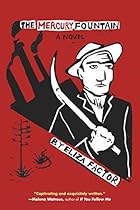 Texas has long has the reputation of being its own place, not entirely subject to the rules that govern other states. Consider that many of its inhabitants still consider it the Republic of Texas and that it was once its own sovereign state. This mindset coupled with its mountainous and desert landscape make it the perfect place to set Eliza Factor's debut novel about a turn of the 20th century utopia centered around mercury mining.
Texas has long has the reputation of being its own place, not entirely subject to the rules that govern other states. Consider that many of its inhabitants still consider it the Republic of Texas and that it was once its own sovereign state. This mindset coupled with its mountainous and desert landscape make it the perfect place to set Eliza Factor's debut novel about a turn of the 20th century utopia centered around mercury mining.As the novel opens, charismatic mine owner Owen Scraperton is summoned from the bowels of the mercury mine to attend his wife as she gives birth to their first child. Scraperton chooses not to wash off the mine residue as he prepares to greet his son (who turns out to be a daughter) because the mine and the utopia he's founded around it, Pristina, define who he is as a man. Over the next two decades of the story, the Principles on which Pristina was founded change and warp as Owen continues to make his utopia an organic thing to suit his own needs. All the while he continues extolling the value of the mercury that flows beneath the surface and that provides a dangerous and unhealthy livelihood to so many of the impoverished in the town and the surrounding mountains.
In addition to Owen, the novel is peopled by strange and broken people. There is Owen's wife Dolores, a much younger Mexican woman who might never have loved her husband and who only finds freedom galloping on horseback, pounding through the barren land around the town. Scraperton daughter Victoria, whose birth opens the novel, is fork-tongued and enamoured of snakes. Her ultimate belief in the original Principles will come into direct conflict with her father's compromised dream and bring about its downfall. Dr. Badinoe, the alcoholic doctor whose scientific knowledge of the poisonous effects of mercury causes him to question his own moral center in remaining in this town, appears through the novel as an imperfect moral compass. And then there's Ysidro, an insignificant peon who becomes a folk hero and a rallying point for the mountain and cave dwelling miners and their families outside the town who, with Victoria, will inadvertantly bring tensions in this dystopia to a head.
This allegorical novel about the dangers of strict, blind adherence to ideology is well written but not terribly engaging. The characters were almost entirely one dimensional and dry. The lead-up to the showdown between Owen and Victoria is long and slow and the pacing is glacial. The family interactions were meant to humanize the characters but dragged instead. The cardinal sin here for me was that ultimately I was bored by the story. Others around the internet disagree so readers interested in western-set utopian novels or in novels dealing with general ideologies should give this their own try.
Thanks to the publisher for sending me a copy of the book for review.




No comments:
Post a Comment
I have had to disable the anonymous comment option to cut down on the spam and I apologize to those of you for whom this makes commenting a chore. I hope you'll still opt to leave me your thoughts. I love to hear what you think, especially so I know I'm not just whistling into the wind here at my computer.